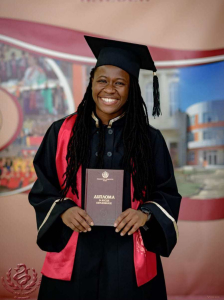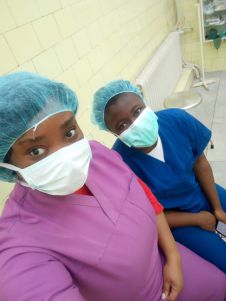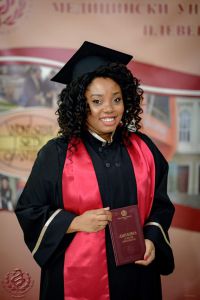A Journey to Medicine - Qualifying Abroad
- Oct 2, 2018
- 9 min read
As part of our plans to expand this year, we have decided to share the stories of many Melanin Medics (both doctors and medical students). We believe that it is very important to show that our journeys to Medicine may differ greatly but ultimately the destination remains the same. Through out the year we will be interviewing various Melanin Medics at different stages in their training/ careers, giving them the opportunity to share their personal stories of the steps they took to excel in their careers and get to where they are today.
We had the privilege of being able to interview not one but two doctors. Dr Dearie Okwu and Dr Sarah Sonde, who have recently graduated with honors from Medical University Pleven in Bulgaria, shared their stories and personal experiences of their time in medical school with us.
MM: I AM SURE YOU BOTH MUST HAVE ANSWERED THIS QUESTION A FEW TIMES, BUT WHY DID YOU WANT TO STUDY MEDICINE?
DO: I felt like (and still feel like) it’s one of the only professions where you have a chance to change lives intimately. Another factor was the fact that my parents wanted me to study medicine too.
SS: I have just always wanted to study medicine, but I suppose it just got closer to home with my mum being a nurse and watching her. When we were growing up she was the only nurse in the neighbourhood, and people who weren’t feeling well would always come to our house, and she would treat them. It was amazing because someone’s child would be sick and would come to her, and then the next day we would be playing together! So at that time it felt like she had super powers, and I wanted one too. We also cared for my granddad, so I think that also played a role.
MM: I KNOW THAT YOU BOTH COMPLETED DEGREES PRIOR TO STUDYING MEDICINE, SO COULD YOU TELL US A BIT MORE ABOUT YOUR JOURNEY TO STUDYING MEDICINE IN BULGARIA?
SS: I was interested in medicine as a young person as we mentioned before, so right off the bat I knew that I had to well in the sciences. I pursued them and did Physics, Chemistry and Biology as well as Maths for A Levels. But I didn’t get the grades that I needed, so decided to do Clinical Sciences at University. At that time, this was a course that had the option of transferring to Medicine after the first year; which I tried to do but wasn’t able to either, so I finished the degree. Even after this I still wanted to study medicine because the passion was still there. Many people told me to consider alternatives, and I did – I went to accounting and economics classes, but it just didn’t fit for me.
So I decided to apply for postgraduate medicine in the UK, and at this point I had the required grades as I re did my GCSEs, and I also did the required activities again like volunteering. So I felt like I had everything that I needed, however I still didn’t get into medicine. After all of this I started to consider studying abroad, so I applied to study in Bulgaria, the Czech Republic, Hungary and Spain. Bulgaria seemed like it was the quickest and cheapest option and also it was part of the EU, so here I am!
DO: So for me, I was actually interested in Law at one point! But after my first year of secondary school, my teachers felt like I was excelling more in the sciences rather than in other art and commercial courses, so I changed my route and focused on science. After high school I applied to study medicine and received an offer to study at Igbinedion University, Okada in Nigeria. However after the first year I didn’t pass chemistry, so it was either I dropped out or changed my course. The course options I had were Pharmacy, Biochemistry or Microbiology. Due the fact that I don’t like chemistry, I decided to study Microbiology and did it for four years.
After I graduated I could either do my masters in Public Health because I wanted to stay in the medical sector, or apply to study medicine. My parents were the ones who were funding me and would only agree to fund my education if I was studying medicine, and I actually got an offer to study medicine in the Philippines. It would be a four-year course, which appealed to me, as I didn’t want to spend an additional six years studying. I was supposed to study there, however I couldn’t get a Visa. The admissions team offered to defer my admission for one year, but that would be another year that I wasn’t studying, so I decided to look at other places. I applied to Bulgaria and Romania as well as other places outside of Nigeria, as I wanted exposure to other health systems. I received admission to Bulgaria and here I am!
MM: WHAT EXTRACURRICULAR ACTIVITIES HAVE YOU BEEN INVOLVED IN OVER THE YEARS?
SS: I think it was mostly travelling for the both of us! Some of our travels also included medical related trips too. I did a professional exchange in Brazil and was also able to do a bit a sightseeing in Rio which was fun. Also a lot of our activities outside of our studies were to do with our Christian Union, which started in 2015. It was one our main commitments as I was president of our CU for two years, which involved a lot of managerial and administrative activities. I also competed in 2 basketball tournaments which I enjoyed a lot. During my time I’ve also learnt how to sew which I really love. I really do feel like you have to have something else apart from studying.
DO: I’ve been to Mexico twice. Both of us have been to different medical conferences in countries like Romania and Hungary. We’ve also visited places like Croatia, Rome, Vienna and Istanbul. I was the treasurer and secretary of our Christian Union. I also learnt how to do nails whilst I’ve been here and enjoy giving my friends manicures, and I enjoy painting too. I do agree with Sarah, as I feel like studying can take its toll on you at times. So I feel like you should find things to do that help you destress and decompress.
MM: WHAT ARE YOUR FUTURE PLANS?
DO: So in order to keep things exciting and because I enjoy them, I plan on doing a double speciality as I want to both cardiology and pulmonology. Where I’m from we have a lot of heart issues in the population, so I have this in mind as I plan on going back and working to help my community and country as a whole.
At the moment I don’t know exactly where I will specialise, but I’m in the process of applying. My ultimate goal is to specialise in Australia, as I want to gain as much knowledge as I can and be able to have more to offer when I go back to Nigeria.
SS: So my plan is to go back to the UK and specialise there. Obviously because I’m from the UK and have studied in the EU, it’s one of the easier routes possible. I’m aiming to go through the foundation programme and eventually specialise. My interest lies mainly in surgery, I’m not exactly sure what type of surgery as of now though and I think that’s okay! We don’t always need to have everything figured out all the time.
MM: WHAT DO YOU THINK ARE THE PROS AND CONS OF STUDYING ABROAD?
SO: So I think one of the pros would be meeting different kinds of people. Although you do meet international students in the UK too, I do think that the interactions you have here are a lot more diverse. I also definitely think experiencing the culture here in itself, opens your eyes to see how the world works in other places. I think another pro is that it’s one of the quicker options, if you decide to go abroad the moment you don’t get into medical school in your own country. I feel like this is especially important since medicine takes a while, so every moment counts.
However I think differences in the economic standards of some countries abroad could be a con. For example certain medical procedures, which are routine in the UK (such as an arterial blood gas test) may not be so in the country you’re in. Therefore they will be more theoretical than practical for you. Another con would be that if you’re planning on going back to an English speaking country, most of your own patient contact will be in a completely different language. So in as much as you speak English, having to rewire your brain to have patient contact in English may take a lot of effort from your side. I found that the first time I had to communicate with a patient in English was quite different for me as I wasn’t too sure what to ask or how to start, as certain colloquialisms are lost for me in the hospital. A way to fix this con, would be to try to get clinical placements in your home country whenever you’re back, even if it’s as little as a week. In this way you won’t be at a disadvantage.
I also feel like another con could be feeling less than psychologically. It seems as though a lot of countries outside of the Western world are seen as underdeveloped, this can lead people to assume that you may not know as much or may not be as exposed because you’ve studied there. Again this would be something you can work on, by exposing yourself more to other places if given the opportunity. The first time I did an internship in the UK, I really did feel intimidated by it all, since I was coming from Pleven. However I came to realise that when I was asked questions by the doctors I could answer them or demonstrate what was necessary, which made me feel better and much more confident.
DO: I think exposure is a big pro. So getting to see how medicine works in different parts of the world. I feel like this can make you more competent when attending to people later in life, like if you meet a patient from a different country, and doesn’t speak English very well, you know how to approach them and can handle the situation more appropriately. I think it also teaches you patience.
Another pro would be that I feel like you have a lot of patient contact here, and you’re given room to grow and practise in clinical settings maybe more than your home country. For example in my professional exchange in Mexico I was given the opportunity to stitch a patient after a procedure, whereas in my rotation in Nigeria I was the secondary help as I wasn’t qualified, so I wasn’t able to do anything like this.
A con would be that I feel like what I learn here about certain diseases may not be as relevant back in Nigeria. So for example, common diseases we would see here about once a week in the hospitals, we may not see in a hospital in Nigeria for months. One would combat this by reading up on the specific demographic you’ll be working with.
MM: WHAT ADVICE DO YOU HAVE FOR FUTURE AND CURRENT MEDICAL STUDENTS?
BOTH: In our case we were able to find a family of Christians over here which made living and studying here easier. So you should try and find a group of like minded people, so you can have a support system outside of your family as it isn’t easy being far away from them, so if you do have this then it can make being away from home easier.
Also you will definitely benefit from learning how to manage your time efficiently.
For us – up until about fourth year every bit of our time was accounted for. Our timetables have varied over the years, so our first year and second year timetables had actual times on them, for example 9 am – 10 am we would be doing something. Gradually we got better at using our time effectively so we would have goals for the day and have a certain amount of work to have completed by the end of the day. But before it becomes natural to it would be a good idea to map your days and even your weeks out so you have an idea of what you’re doing.
Another point would be, don’t be afraid to ask questions! Speak up when do you don’t understand something and try and have a cordial relationship with your lecturers and teachers so that they can be confident in the things you do know. Alternately, you should also be humble in learning, because when you’re too confident you end up not asking the questions that you should be asking.
Finally, you should always be trying to eat and sleep properly when possible. Study hard, and realise that you’re also here to grow in every aspect of your life not just your knowledge, so try and do that and grow! Don’t just pass through the experience, let the experience pass through you.
If you enjoyed reading this blog post, please share and follow our blog! Would you like to share your Journey to Medicine on the Melanin Medics blog? We would love to hear from you. Please get in touch – melaninmedics@gmail.com
Interviewed by Jemima Soladoye
.png)
).png)










Comments